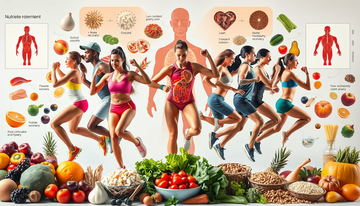As an athlete, you know that proper nutrition is the foundation for peak performance. Whether you're training for a big game, a marathon, or just trying to maintain an active lifestyle, what you put into your body can make all the difference. In this post, we'll dive into the world of sports nutrition and explore the key principles that can help you fuel your athletic endeavors.
The Importance of Macronutrients
When it comes to athlete nutrition, the three macronutrients – carbohydrates, proteins, and fats – play a crucial role. Carbohydrates are the body's primary source of energy, providing the fuel needed for intense workouts and endurance events. Proteins help build and repair muscle tissue, while fats support hormone production and overall health.
The optimal balance of these macronutrients can vary depending on your sport, training intensity, and individual needs. As a general guideline, athletes should aim for a diet that consists of 45-65% carbohydrates, 20-35% proteins, and 20-35% fats.
Timing Your Nutrition
When you eat is just as important as what you eat. Pre-workout, during-workout, and post-workout nutrition all have specific purposes and can significantly impact your performance and recovery.
Before a workout, focus on easily digestible carbohydrates to provide a steady supply of energy. During your workout, opt for simple carbohydrates and electrolytes to replenish what you're losing through sweat. After your workout, a combination of carbohydrates and proteins can help repair and rebuild muscle tissue.
Hydration and Electrolyte Balance
Proper hydration is essential for athletes, as dehydration can lead to decreased performance, muscle cramps, and even more serious health issues. Aim to drink water regularly throughout the day and during your workouts, and consider incorporating electrolyte-rich drinks or supplements to maintain your body's mineral balance.
Nutrient Timing for Optimal Recovery
Recovery is just as important as training, and the right nutrition can make a big difference. Consuming a mix of carbohydrates and proteins within 30 minutes of your workout can kickstart the recovery process and help your muscles repair and rebuild.
Additionally, incorporating anti-inflammatory foods, such as fatty fish, berries, and leafy greens, can help reduce muscle soreness and inflammation, allowing you to bounce back more quickly.
Personalize Your Approach
Remember, there's no one-size-fits-all approach to athlete nutrition. Your individual needs, training schedule, and body type will all play a role in determining the optimal nutrition plan for you. Experiment, listen to your body, and work with a registered dietitian or sports nutritionist to find the perfect balance.
By focusing on the principles of macronutrient balance, timing, hydration, and recovery, you can fuel your athletic performance and take your training to the next level. Embrace the power of proper nutrition and watch as it transforms your athletic journey.




